Compact SUV with PHEV tech and design flair makes its exit. Did it do Alfa proud?
Why we’re running it: To see how well Alfa’s new PHEV small SUV balances rationality and emotion
Month 4 – Month 3 – Month 2 – Month 1 – Specs
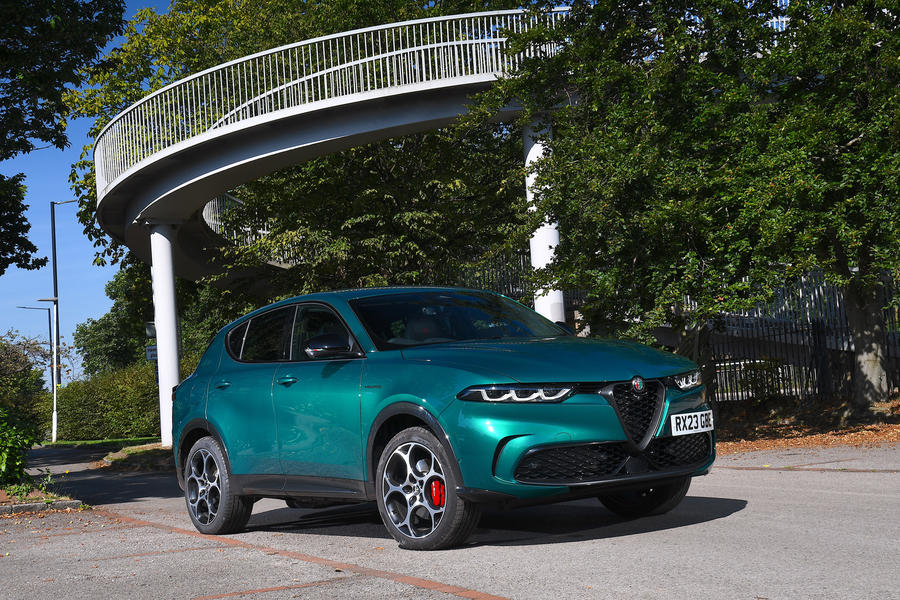
Compact SUV with PHEV tech and design flair makes its exit. Did it do Alfa proud? – 17 January 2024
My more juvenile car friends continue to call our outgoing long-termer the toenail – and yes, its name doesn’t translate brilliantly into English – but having spent a good few months with it, I feel it deserves more respect than that.
The Tonale plug-in hybrid was a long time coming compared with rival offerings, not least because incoming Alfa Romeo boss Jean-Philippe Imparato insisted the car needed to be improved before it could be launched.
The focus of those improvements was not the somewhat lacklustre nature of the powertrain – more of that in a moment – but the ability to eke out a very respectable official EV range of 48 miles. This enabled the Tonale to play to the crucial business car market, in which Alfa hasn’t had a seat for a while now.
That powertrain, for me, is really the sticking point with this car. As I’ve mentioned in previous reports, I got used to it over time and didn’t find myself disliking the car as a result.
But the mix of poor refinement and an electric motor and engine that didn’t seem to work very well together, leading to slow move-offs and some required perseverance when getting up to speed on motorways, ultimately felt disappointing.
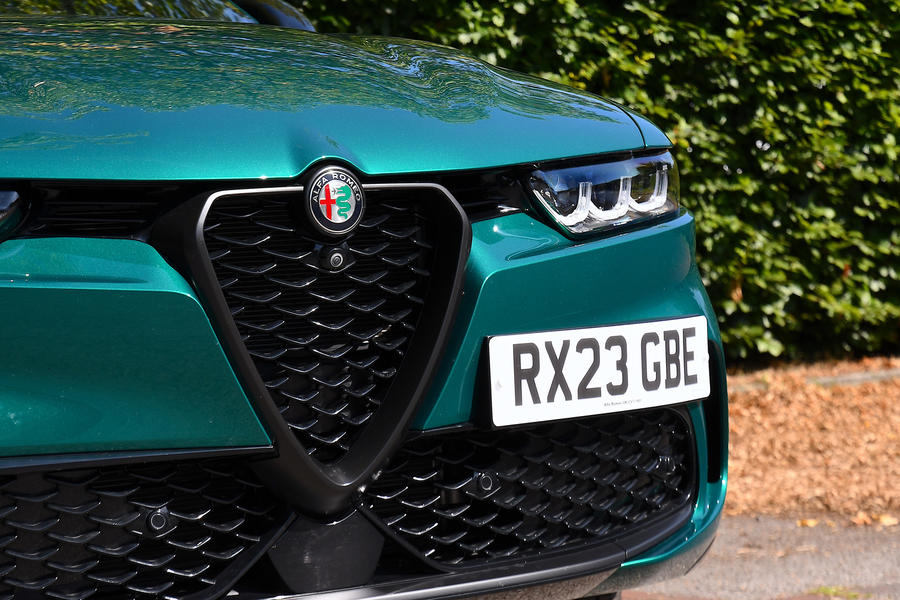
It is Alfa Romeo, after all – but I’d comment on this in any car, Alfa Romeo or not. Put that not inconsiderable point to one side and the Tonale is a good car. First, the looks. It has turned an awful lot of heads during my time with it. I suspect (a) the colour catches people’s attention and/or (b) people don’t recognise the car but think it looks good and/or (c) people know the Alfa Romeo badge and are intrigued by what the model it is. Either way, it feels a positive reaction.
Inside, the car is comfortable, premium and well specified. I like the small Italian flag on the centre console – it adds a little flair rather than feeling gauche – and the sporty touches, particularly the black seats with perforated red holes, suit the car well. The overall design and quality of the dashboard, centre unit and steering wheel feel at the right sort of levels, but it could be even more cohesive overall in its style, I reckon.
I particularly appreciated the supportive driver’s seat and the physical, reachable toggles for temperature controls. So much so that I’d just like to reiterate: can all car makers copy this, please?
The rest of the infotainment and systems worked well. Apple CarPlay took a minute too long to connect automatically and the faulty speed limit recognition system occasionally threw me off, even though I know that a 12mph limit isn’t a thing in the UK, but that’s the extent of my gripes.
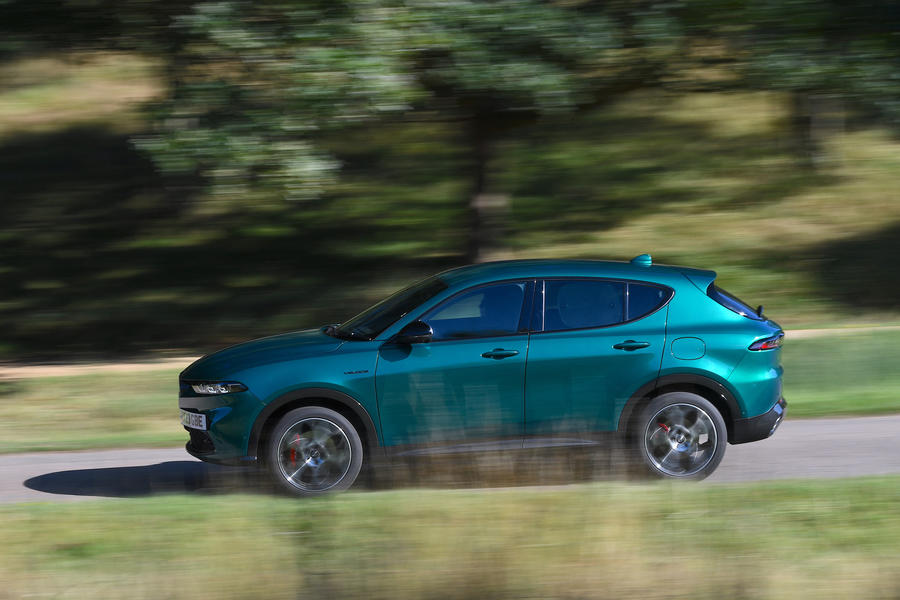
I really missed heated seats, given the generally A high spec of the car. Alfa’s online configurator shows you can get them as part of a £450 winter pack. It doesn’t feel as though maximising interior space has been a focus, but neither is it awful.
The boot is 385 litres versus the plug-in BMW X2’s 410 litres and it has no lip to ensure easier access. Rear space is respectable too. Packing for a week’s holiday for three took up the whole boot and the second passenger berth in the back. Although you always pack more when you have the luxury of a car…
On the road, the Tonale can be fun, something I particularly appreciated on quiet, cross-country roads on various trips to visit friends in the countryside. The steering could do with a bit more weight to it, but it’s direct, making it enjoyable on tighter corners and weaving roads. It’s not an especially fast car, but it feels more than capable of holding its own on bends, stifling body roll and understeer.
It’s a lovely size for it too. As I’ve found with my last few plug-in hybrid long-term test cars, they all tend to average out at around 40mpg. I’m sure if you drove predominantly on electric power, as I would have done if I had a driveway on which to charge the car, it would be a slightly different story.
Still, when I did fully charge it, it covered comfortably more than 40 electric miles with little eco-driving effort on my part. And it falls into the 8% benefit-in-kind tax band, coming back to its appeal as a business car, which was largely the point.
So it’s considerably more impressive than a toenail. It’s reasonable to consider the car a solid contender in the premium compact SUV class, but once that powertrain is sorted, which I’m convinced is within Alfa engineers’ reach, the Tonale should sit among the best of them.
Second Opinion
Can we have an Alfa that combines rational qualities with being good to drive? The Tonale is a big leap forward in quality and usability but is badly let down by its drivetrain. If Alfa could get the Giulia’s everyday dynamic ability into a car that plays to the Tonale’s strengths, it would be onto a winner.
Mark Tisshaw
Love it:
Ergonomic simplicity: Easy-to-reach, tactile, physical up/down toggle for the climate control. Hurrah.
Green machine Great colour: perfectly Italian, perfectly Alfa Romeo. Garnered much attention
Best supporting role Excellent lower-back lumbar support in the driver’s seat for my ageing spine.
Loathe it:
So-so powertrain A brand like Alfa Romeo needs to seriously up its PHEV powertrain game.
Know your limits Randomly faulty speed limit recognition system is off-putting even if you know it’s wrong.
Final mileage: 8215
Life with a Tonale PHEV: Month 4
We’re coming to terms with a PHEV powertrain that initially troubled us – 12 December
One of my colleagues described an early Tonale as “the worst car I’ve driven in years”, in reference predominantly to its plug-in hybrid powertrain. It was flippant, intended to get a laugh, but there was some truth in there too.
Road test editor Matt Saunders was kinder than that writer, who shall remain unnamed, when he said in our long-term ‘hello’ report: “The Alfa’s slightly noisy combustion engine and a note of underlying uncouthness of its hybrid powertrain both disappointed me. But it takes practice to engineer in the kind of slickness that the best purveyors of PHEVs can now conjure, and Alfa hasn’t had much experience.”
I’ve been living with the Tonale for a few months and here’s my take: at the beginning, I thought the powertrain was fairly awful. In a way that was tolerable but a bit embarrassing when compared with rivals.
But as is the point with long-term tests, the longer you live with something, the more you get used to it (or not). And as time has gone on, I’ve adapted. I am still objectively aware that it isn’t competitive, but it doesn’t go so far as tarnishing the overall enjoyment of the car.
The system uses a 1.3-litre four-cylinder turbo petrol engine to drive the front wheels and an electric motor for the rears. This gives it a combined output of 276bhp and a 0-62mph time of 6.2sec, but it never feels quite that fast or powerful, partly because of its mid-range lethargy. If you want the electric motor to engage, you need to seriously put your foot down; you don’t get the easy electric surge provided by some PHEVs.
It’s not very wise to attempt swift getaways at roundabouts, and getting up to speed on the motorway takes a bit more work than you might expect. And when the engine is working hard, it growls – and not in a good way.
For all my own and my colleagues’ thoughts, an Autocar reader, Dave from Cornwall, recently made contact (thank you) to tell me how much he was enjoying his Tonale PHEV, which he has owned for two months so far.
While he was dubious of eking out the claimed 48 electric-only miles and was struggling with Alfa’s corresponding smartphone app, he made absolutely no mention of the powertrain or refinement.
Like it
Its compact footprint is perfect for town runs and endless parallel parking on tight suburban streets.
Loathe it
Minor damage
It doesn’t matter how well you park on said streets: other drivers remain incapable of not scuffing your bumper.
Mileage: 7825
Life with a Tonale PHEV: Month 3
Multi-stop trip with a toddler and luggage crammed in reveals plenty of positives – 29 November
There have been no far-flung adventures of late for which to use the Tonale as my carriage, but a recent multi-stop trip meant plenty of hours in it for me to ponder its strengths and foibles.
First up, flinging everything into the car in disorganised fashion. A compact buggy, two jam-packed overnight bags, a small bike (on the rear seats) and lots of smaller bags fitted in fine, even if I had to be a little firm when closing the boot. With the toddler firmly secured in the rear, the first stop on our not-quite-adventure was around the M25 from Twickenham to Romford.
This was uneventful, other than the realisation that there’s an incredibly noisy surface on the most northerly part of the M25, similar to that on the south-west side that I dislike.
Having arrived at our destination, the compactness of the Tonale was advantageous when parking on a tight driveway and not wishing to block the pavement. My relative (who drives a Peugeot 3008, if that’s relevant) said “not sure about the colour!”, but I defended it. Besides, you should have seen the garish cars I had spotted around the corner. When in Essex…
Getting back in the Tonale for a long, dark evening schlep up the M11 to my dad’s house in Bedfordshire, I appreciated the particularly bright full beams. And I’m still enjoying the smallest of wins: a physical up/down toggle for the cabin temperature on the right side of the centre console, which is just so straightforward to use and – importantly and not a given – within easy reach so not distracting to operate.
After a long day of driving, socialising and parenting, I noticed the seat’s lumbar support for the lower back, and not for the first time. A few months ago, I went daytime dancing (not a common occurrence) and put my back out. I’m old. It eased after a few days, but a key thing that provided comfort was sitting in the Tonale’s driver’s seat. Having reached Dad’s, I hooked up to his electric supply. I would be doing a lot of short local journeys for a couple of days, and having the luxury of a driveway with a power supply meant I wanted to make the most of the Tonale’s PHEV functionality. Oh, and I wasn’t paying (thanks, Dad).
Having a permanent parking spot also meant I could leave the cumbersome charging cables out and just plug in without any effort. It’s by no means a problem singular to the Tonale, but there must be a product designer out there who can make these unwieldy things significantly more user-friendly.
Enjoying the electric power on multiple short journeys, all of which involted ways tet stable ands, the control, even if I didn’t push its limits on said lanes.
Eventually, it was time to pack up and head back to Middlesex. On the return leg, I noted 43 claimed electric miles remaining, cruised in EV mode and watched when they ran out. I’m pleased to report the car drove more miles on zero emissions than it had predicted, and with little eco-driving effort from me.
Home 300-plus miles later, there was plenty to celebrate and little of which to complain. The Tonale is by no means perfect, but if you can do multiple journeys on often unfamiliar roads with toddler (and corresponding Peppa Pig songs) in tow and still feel happy about driving it, that’s a great sign for owning one.
Love it
Easy being green
I’m still enjoying the colour: the Montreal Green is bright but not ostentatious, in my opinion.
Loathe it
Are you sure?
The speed limit recognition system remains a nuisance, sometimes being faulty.
Mileage: 7100
At last, the substance of an Italian interior matches the style – and it’s simple to use – 1 November
We all know that over the past couple of decades, it has been the German premium brands that have set the benchmark for high-quality interiors, good user experience and so on.
Of course, no brand is perfect, but they’re all up there. Jaguar Land Rover eventually caught up and now makes some very appealing cabins with good functionality to match.
What about the Italians? Well, in our recent battle of the Range Rover Velar and new Maserati Grecale (4 October), it was the latter that emerged victorious, if only just, thanks in part to its interior.
Maserati is owned by Stellantis, as is Alfa Romeo, the maker of our Tonale. So where does its interior rank within the small SUV class? Having driven the Tonale for a good couple of months now, my lasting impression of the interior is nothing but positive. But I’m also aware that one gets used to jumping in a car and quickly getting on one’s way; so, knowing that I wanted to write in detail about the interior, I went to simply sit in the Tonale and have a proper look, feel and play.
Firstly, the materials. Perceived quality is good, mostly. Yet the more I look, the more it feels like there’s one too many types of plastic going on. The end result is united enough for me not to have noticed in daily use, but now it feels a tad bitty.
For example, gloss black plastic surrounds the central air vents, which matches the nearby touchscreen but nothing else. The surround of the window controls could be better as well. The dominant finish – not because it’s the most prominent but because it is the most stark – is a grey diamond texture, found largely on the centre console, air vents and door-handle casings. It’s also in a long swoosh across the dashboard with raised pointy bits. I’m sure there’s a fancy name for it, but all I can suggest is that it’s intended to convey sportiness of some kind.
That’s true more broadly of the interior. There are sporty-looking Alcantara and leather seats with punched holes featuring red behind, complemented by red stitching on the headrests and Alfa Romeo logos in red. As is my way these days, I revert to Apple CarPlay almost always when getting into the Tonale. It connects well, but you often have to force it into doing so rather than it happening automatically.
It probably would connect automatically after a couple of minutes, but I live on a quiet street between two very busy roads, so I need to know instantly which is better for traffic without having to faff with my phone as I’m about to set off.
I’m really enjoying the prevalence of physical controls (rather than everything being done through a touchscreen) and the positioning of them.
It sounds so simple, but the climate controls are on the left for the passenger and the right for the driver; they’re simple up-and-down switches, tactile and within easy reach when I’m driving, which isn’t often the case. Why can’t they be this brilliant in every car?
When I picture an Audi or a BMW interior, my hunch is that they might tip the balance with a more cohesive overall design and better finish than the Tonale, but it’s a close call. And the Alfa’s pay-off is that it manages to express a bit more character, which is quite rare in today’s world of all-black, corporate-feeling interiors.
Love it
Fits fine
At 4.5m long, 1.8m wide and 1.6m tall, it’s the perfect size for tight London streets
Loathe it
Numb bum
The first signs of winter are showing. Where’s a heated seat when you need one?
Mileage: 6586
Life with a Tonale PHEV: Month 2
Keep your eye on the limit… – 25 October
The speed limit recognition can be wildly inaccurate. It seems to convert the limit in miles to km but I can’t be sure. Sometimes it says ‘12’ and I think that’s in a 20mph zone (20km is 12 miles). I’ve seen ‘22’ too (30km is 22 miles). Other times, it says ‘80’, which doesn’t fit the theory. But sometimes it works well. Moral: read limits the old-fashioned way.
Mileage: 6101
Alfa’s Italian flashes are molto bene – 18 October
Patriotism in car design can feel a bit crass to me. But Alfa’s subtle detailing of the Italian flag seems a deserving and tasteful nod to something that feels so inherent, so vital to the legacy (and future) of the brand. The little tricolore is on each wing mirror and the centre console, and it works even better with our car’s Montreal Green paint
Mileage: 5293
Life with a Tonale PHEV: Month 1
The Tonale’s assistance systems are a bleeping nightmare – 27 September
Driving home from a funeral, I edged close to a hedge on a tight road and the side sensors started beeping. Irritating when driving but not abnormal these days. But the beeping didn’t end. I stopped the car at least three times, and each time I restarted, the beeping continued… for the entire hour-long journey home. Not what you want on the best of days, let alone the worst.
Mileage: 4613
Welcoming the Tonale to the fleet – 20 September 2023
Here’s a potted recent history of Alfa Romeo: it was loss-making until parent company Fiat Chrysler was subsumed into a new conglomerate, Stellantis, which quickly made it profitable, under the watchful eye of Jean-Philippe Imparato, already esteemed for his positive impact on Peugeot.
New cars have been sparse, and while the Giulia saloon is well-liked by us and others and the Stelvio is a talented SUV (albeit an ageing one with no electrified powertrains), the introduction of a small SUV was well overdue.
Enter the Tonale. Luxury brand or not, if you don’t have a compact SUV on your books these days, you’re dead in the water. The Tonale was revealed in 2019, but after Imparato joined in early 2021, it was delayed before arriving last year.
Why? Well, as a perfectionist and a true Alfista, the Frenchman wasn’t happy with the electric-only range of the plug-in hybrid, nor the “Alfa Romeo touch and feel” of the mild hybrid. Those are the two variants now available, with our new long-termer being the plug-in hybrid.
One of the reasons that Imparato wanted that EV range to be decent was to ensure it appealed to fleet customers. After all, it’s the most fleet-relevant car that Alfa has made in donkey’s years. Just over half of Tonale sales are to fleets,
and the SUV unsurprisingly already accounts for two-thirds of the brand’s UK sales, so it’s a considerable volume that is going to businesses.
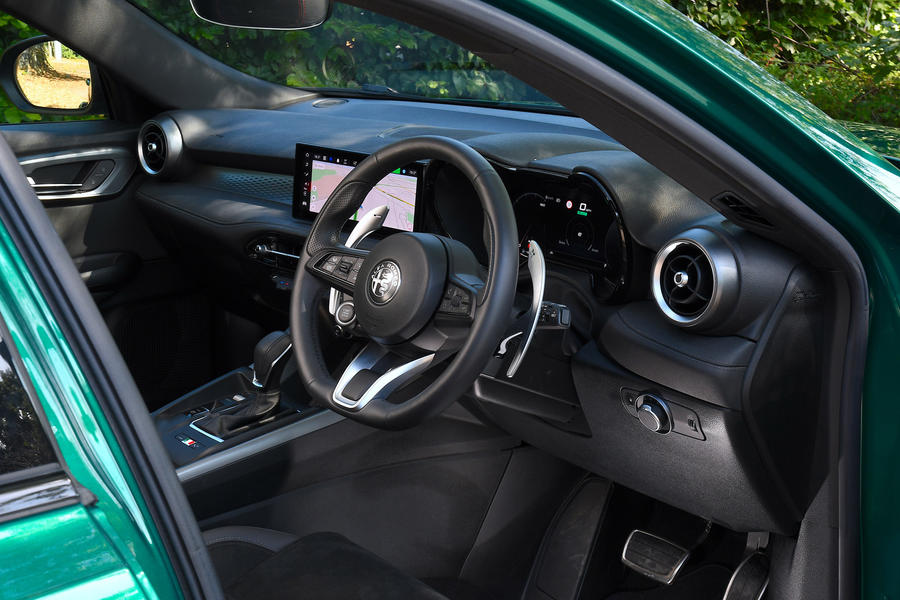
For now, the 1.5-litre MHEV is still the more popular powertrain, making up 58% of sales, but Alfa expects the balance to flip as full availability of the 1.3-litre PHEV comes into play in the UK.
That will also improve Alfa’s overall sales standing here, which is down 7.6% year to date. The maker says that’s a result of it moving away from internal combustion cars and the delay in the PHEV arrival.
Anyhow, the summary is that the Tonale might not be the Alfa of your dreams, but it is the Alfa that the company desperately needs.
So to ours. First, that colour! Already found on the Giulia, it made me smile when I first potted it on my street. Regular readers might recall that I’m not one for bright colours (although I wouldn’t say no to a yellow McLaren if offered, obviously), but this Montreal Green – a £1500 option – is on the loud side without being garish. Maybe it just feels, well, very Italian, and very Alfa.
The other two options on our car are the Mode 3 charging cable, which helpfully connects your car to a charging station, and the autonomous driving L2 pack, which is a fancy name for some assisted driving functions as intelligent adaptive cruise control, advanced lane keeping assistance and a front-facing camera.
Included as standard on Veloce trim (the middle and most popular) are a 10.25in touchscreen system with a DAB radio, sat-nav, Apple CarPlay and Android Auto, plus a wireless smartphone charging pad and hands-free boot opening.
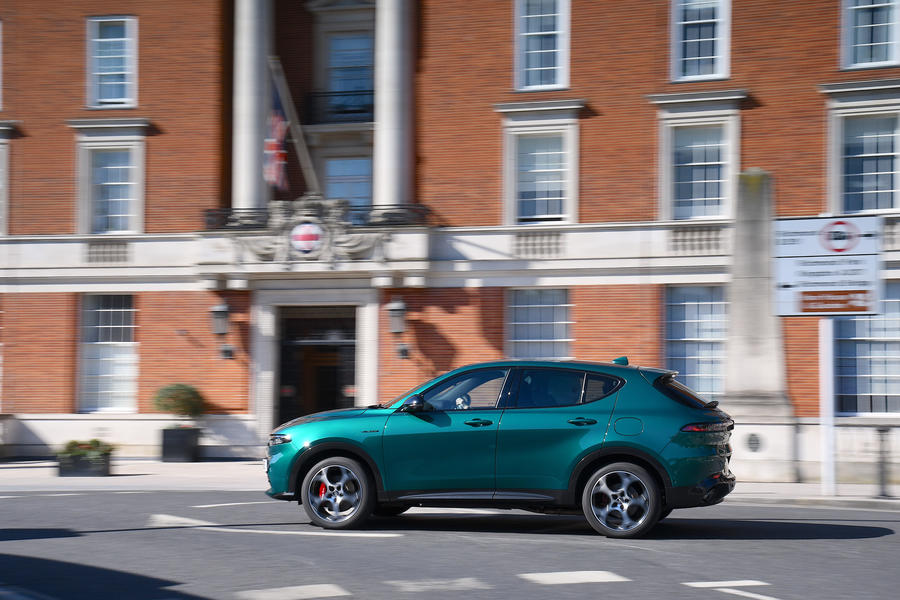
The powertrain is an uprated version of the one found in the Jeep Compass 4xe (although Alfa doesn’t like that reference). It has the same 177bhp four-cylinder turbo petrol engine driving the front wheels through a six-speed automatic gearbox, but the electric motors are more powerful than the Jeep’s, at 121bhp. That all delivers four-wheel drive and a 0-62mph time of 6.2sec.
It has a bigger battery too, with a capacity of 15.5kWh, which promises up to 48 miles of electric range. Time will tell, but I’m hopeful that I can comfortably get more than 30 miles of range in the real world.
As you can see from our road test editor’s comments (below), the PHEV powertrain hasn’t been as well received as Alfa might have hoped, mostly because of its legacy as a sporting brand. But living with a car is very different to an intensive road test, so let’s see how I come to feel about it over the next few months.
I continue to be amazed by how expensive cars are these days, but to be fair to Alfa, the Tonale is on par price-wise with key rivals including the BMW X2 and the Jaguar E-Pace.
It’s an exciting time for Alfa: money-making once again and able to justify making truly exciting cars such as the recently-revealed 33 Stradale supercar. Now is my chance to see if the Tonale offers any clues about where the brand is heading.
Second Opinion
When I compared a Tonale with an equivalent Audi Q3 earlier this year, Alfa’s inexperience with PHEVs was made clear by a comparative uncouthness about its powertrain. However, there was also much to like about the newcomer, not least its surprisingly agile handling.
Mark Tisshaw
Alfa Romeo Tonale 1.3 PHEV 280 Veloce specification
Prices: List price new £48,495 List price now £48,495 Price as tested £51,595 Options: Autonomous driving L2 pack £1250, PHEV Mode 3 charging cable £350, Montreal Green paint £1500
Fuel consumption and range: Claimed economy 217.3mpg Fuel tank 42.5 litres Test average 40.2mpg Test best 42.5mpg Test worst 37.6mpg Real-world range 375 miles (petrol), 42 miles (electric)
Tech highlights: 0-62mph 6.2sec Top speed 128mph Engine 4 cyls, 1332cc, turbocharged, petrol Battery 15.5/12.0kWh (total/usable) Max power 271bhp Max torque 199lb ft at 1850rpm Transmission 6-spd automatic, 4WD Boot capacity 385 litres Wheels 19in, alloy Tyres 235/45 R19 Kerb weight 1910kg
Service and running costs: Contract hire rate £658 CO2 29g/km Service costs None Other costs None Fuel costs £638.18 (petrol), £14 (petrol) Running costs inc fuel £653.18 Cost per mile 18 pence Faults Speed limit recognition system
Source: Autocar
